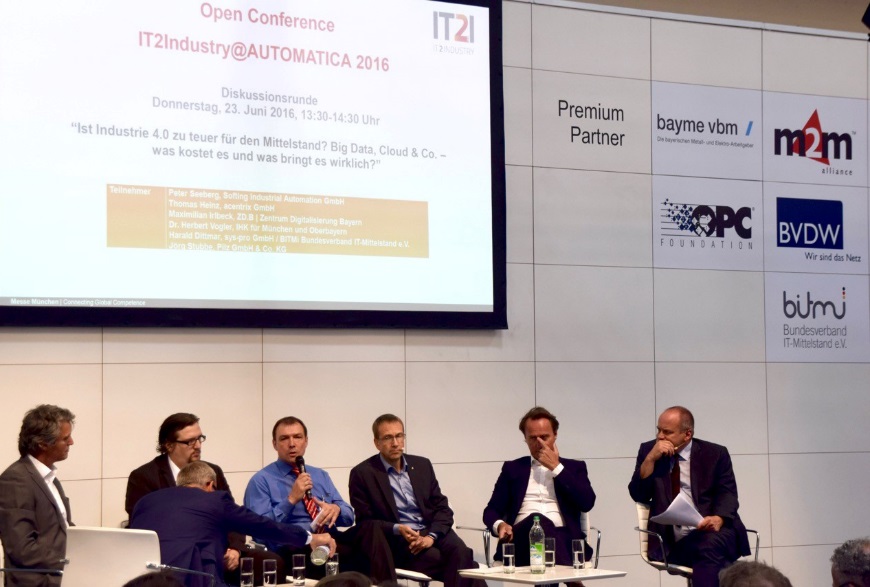"Many questions remain unanswered"
 Reflections on Industry 4.0 on the occasion of IT2Industry - the International Trade Fair and Open Conference for Digital and Connected Work Environments.
Reflections on Industry 4.0 on the occasion of IT2Industry - the International Trade Fair and Open Conference for Digital and Connected Work Environments.
IT2Industry, which was held in Munich from June 21-24, focused on the digitization of industrial production and bundled products, solutions and services related to the Industry 4.0 era. Thought leaders, experts and companies presented, in some cases live, the latest developments in automation, manufacturing and production in the direction of Industry 4.0, while discussion forums on the topic were held in parallel. Harald Dittmar, member of the BITMi executive committee and managing director of syspro, was there.
Mr. Dittmar, which impressions did you take home with you?
The walk through the fair was very informative. Of course, a lot of familiar things awaited us, but also some new impulses. What was interesting for me - in addition to the good practical relevance of the trade fair - was the opportunity to exchange ideas about visions, possibilities, advantages, but also disadvantages, concerns and risks of Industry 4.0. The reason for my visit was also to participate in a panel discussion on the topic of Industry 4.0 and SMEs. This exchange of ideas was and continues to be important and necessary. It showed that many questions are still open and that we are at the beginning of a development that we may still be able to determine ourselves.
How are SMEs positioning themselves with regard to Industry 4.0?
The position of medium-sized companies is rather reactive. This is a great pity, as it means that some innovations fall by the wayside. Simply stating that SMEs are not equipped for 4.0 does not really help. The causes should also be named and countered in the sense of more active co-design. Of least use here is an argument that calls all competitiveness into question without Industry 4.0. It is counterproductive and leads to even more skepticism, because many companies feel more pressured by it. Since, for the typical SME, productivity increases can be achieved with lean production even without a high investment risk, they are aware of the importance of 4.0, but do not yet see any reason to deal with it, at least in a timely manner. Other topics that SMEs are very skeptical about, especially with regard to big data, are data security and data protection. And rightly so, because despite the recent data scandals, there is still no comprehensive legislation in this regard.
In your view, how can this skepticism be countered?
I speak from experience here - in my function as a representative of BITMi and as CEO of syspro: It is useless to "impose" complex Industry 4.0 processes on medium-sized companies. What is needed here are lean solutions and suitable cloud solutions that enable a smooth transition and promise secure processes. Most SMEs have neither the necessary know-how nor a corresponding technical and financial basis for 4.0 and initially focus on small steps and the expansion of existing machines and systems. The primary focus here is therefore on automating and optimizing production processes and creating opportunities for a confidence-building entry into the subject, rather than immediately changing entire business models.
What is your opinion on "Industry 4.0"?
"Industry 4.0" is a term coined at the initiative of the German government at the Hanover Fair in 2011. The number "4.0" was intended to be a reference to the term "4th Industrial Revolution" in order to make it clear that the changes are as significant as the predecessor revolutions 1.0, 2.0 and 3.0.
And I have my problems with this claim. The three predecessors each have something truly revolutionary and previously unheard of as their starting point: while the 1st Industrial Revolution began with the use of water and steam power, the 2nd discovered electrical energy, and the 3rd introduced electronics and IT in the 1970s to automate production, the 4th Revolution now being propagated is actually - at least from a technological perspective - just a continuation of this. In my view, the symbiosis of industrial production and state-of-the-art information and communications technology is more evolutionary. After all, where does lean production end and Industry 4.0 begin? It's not a turning point, it's a process.
I am convinced that the production of the future will develop in the direction of 4.0 and, as the managing director of a company for process-related IT solutions, I know the potential behind it when IT, production and business management work hand in hand. The question here is not pro or contra, the question is rather: how do we create the conditions so that 4.0 can work? What we need here is not just the definition of a goal, but a fair amount of foresight to be able to achieve this set goal. And, very importantly, just wanting to move forward technologically is not enough.
For me, the entire public discussion is too engineering-heavy. The term 4.0 limits itself too much to the establishment of the "smart factory" and leaves out the market and everything outside production. Whereas in America, for example, the "Industrial Internet" includes not only production but also other business areas such as services and processes along the entire value chain, the German approach tends to focus on technological concepts and internal factory engineering solutions. And: Industry 4.0 cannot be successful if it is not developed with people in focus. We also need to design it in a social way. The concern that the human workforce is now being replaced by the self-thinking machine is entirely justified. It remains to be seen whether the argument that hundreds of thousands of new jobs will be created in many new business areas to make up for the lost jobs - an argument that I think has been thrown out a bit too quickly - is really reassuring. Especially since there are very contradictory statements about the numerical ratio.
Of course, new job profiles will be created in order to master the complex networking and the new platforms. But this will be accompanied by new requirements for the training and qualification of employees. However, these require an education system that would have to be adapted to these new requirements. Will our education system be able to cope with the expected challenges? Or will and must companies also become more involved in promoting young talent? Is the positive assessment of the overall economic effect - that higher qualifications also lead to higher salaries - also sustainable? After all, how will companies deal with the added value generated by Industry 4.0? Technological developments are causing drastic changes in the world of work and in the social structure. Are we prepared for this to the extent we need to be? And what standards should apply? What communication networks will be needed? What about the security of the systems?
Many questions remain unanswered. And it remains exciting.


